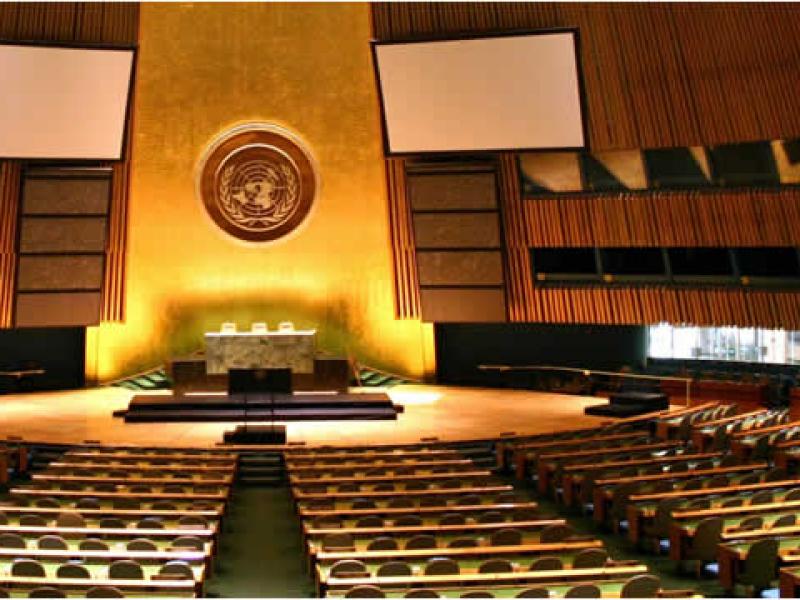On June 26, 1945, delegates from fifty nations gathered in the auditorium of Veterans Memorial Hall in San Francisco to sign the new United Nations charter. The war-weary American people watched the development of this new international organization with significant hope and a touch of skepticism. Over the seven decades since the signing of the charter, how have the American people seen the U.N.? From the Roper Center for Public Opinion Research Archives:
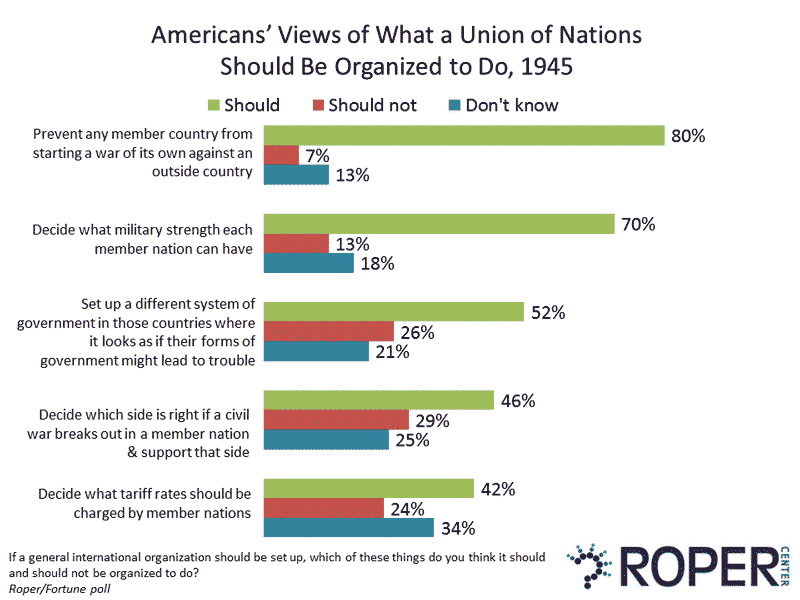 The potential membership of such an organization, however, was controversial. Nearly all Americans agreed that the Allied countries should be members, but the country was split on whether the Axis powers should be included. The public was also divided on how power ought to be allotted among member organizations. While 43% thought all member countries should have equal say, 45% believed that either the U.S. alone or the U.S., Britain and Russia together should wield greater influence.
The potential membership of such an organization, however, was controversial. Nearly all Americans agreed that the Allied countries should be members, but the country was split on whether the Axis powers should be included. The public was also divided on how power ought to be allotted among member organizations. While 43% thought all member countries should have equal say, 45% believed that either the U.S. alone or the U.S., Britain and Russia together should wield greater influence.
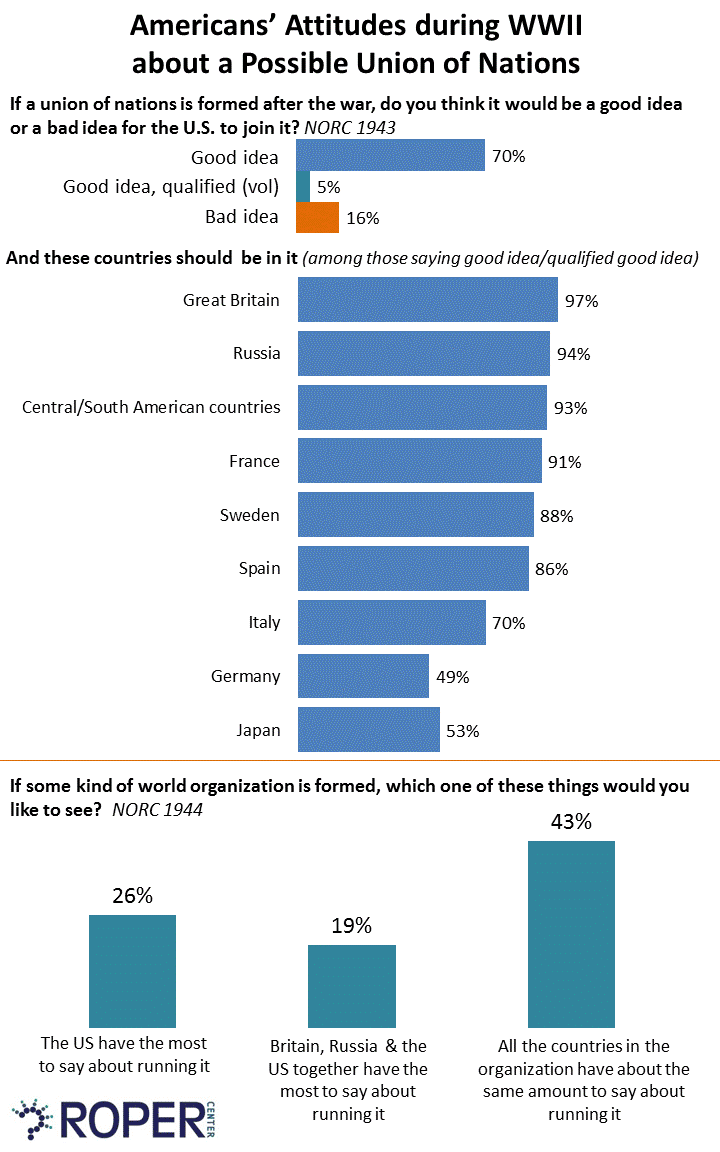 In April 1945, the San Francisco conference to write the charter was held. In a NORC poll, just over half of the public wanted the U.S. delegate to pledge the country to join the world organization and promise the use of American forces if needed. Twenty-three percent wanted the U.S. to join, but not commit troops, and 18% did not want the U.S. to join at all. Some Americans were quite optimistic about the potential effectiveness of the organization, while others had doubts. In a Gallup poll, 44% thought it was possible the U.N. would work out a peace that would last for at least 50 years, 36% said no, and 20% didn't know. But despite reservations, a strong majority wanted the country to be part of the new union of nations. An Office of Public Opinion Research poll found 81% of the country thought the U.S. should join the organization being worked out by the United Nations at San Francisco, even if we “didn't like some parts of it."
Many Americans, in fact, were willing in the first years of the U.N. to see its power go further - much further. A majority said the U.N. should be strengthened to make it a world government with power to control the armed forces of all nations, including the U.S. But opposition to this idea grew in the 1950s.
In April 1945, the San Francisco conference to write the charter was held. In a NORC poll, just over half of the public wanted the U.S. delegate to pledge the country to join the world organization and promise the use of American forces if needed. Twenty-three percent wanted the U.S. to join, but not commit troops, and 18% did not want the U.S. to join at all. Some Americans were quite optimistic about the potential effectiveness of the organization, while others had doubts. In a Gallup poll, 44% thought it was possible the U.N. would work out a peace that would last for at least 50 years, 36% said no, and 20% didn't know. But despite reservations, a strong majority wanted the country to be part of the new union of nations. An Office of Public Opinion Research poll found 81% of the country thought the U.S. should join the organization being worked out by the United Nations at San Francisco, even if we “didn't like some parts of it."
Many Americans, in fact, were willing in the first years of the U.N. to see its power go further - much further. A majority said the U.N. should be strengthened to make it a world government with power to control the armed forces of all nations, including the U.S. But opposition to this idea grew in the 1950s.
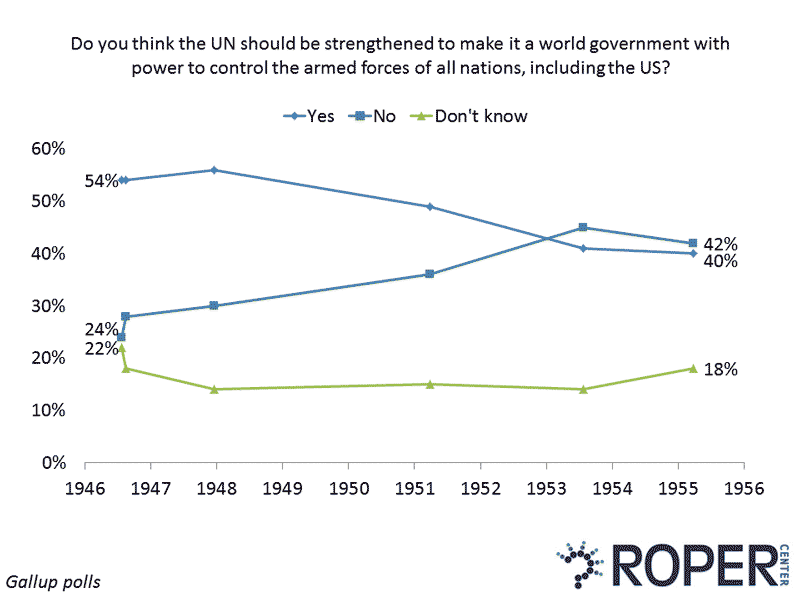 Americans may have become less willing to see the U.N. grow into a world government, but that change does not necessarily indicate growing disenchantment with the organization in this period. On the contrary, the proportion of people saying they were satisfied with the progress made by the U.N. increased substantially over approximately the same time frame.
Americans may have become less willing to see the U.N. grow into a world government, but that change does not necessarily indicate growing disenchantment with the organization in this period. On the contrary, the proportion of people saying they were satisfied with the progress made by the U.N. increased substantially over approximately the same time frame.
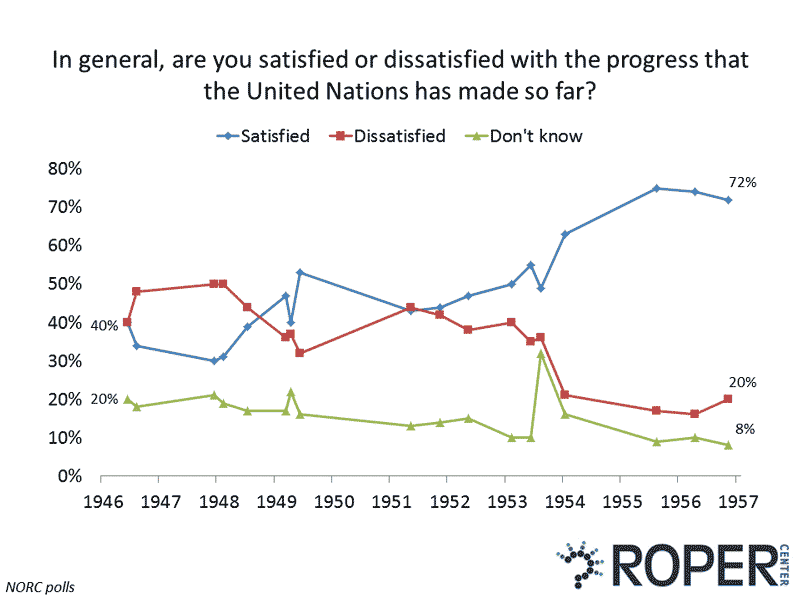 Positive attitudes continued through the 1960s. A 1964 Anti-Defamation League of B'nai B'rith/NORC poll found 87% of Americans in favor of the United Nations. In a 1965 Gallup poll, 59% believed that, without the U.N, there would have been another world war.
Positive attitudes continued through the 1960s. A 1964 Anti-Defamation League of B'nai B'rith/NORC poll found 87% of Americans in favor of the United Nations. In a 1965 Gallup poll, 59% believed that, without the U.N, there would have been another world war.
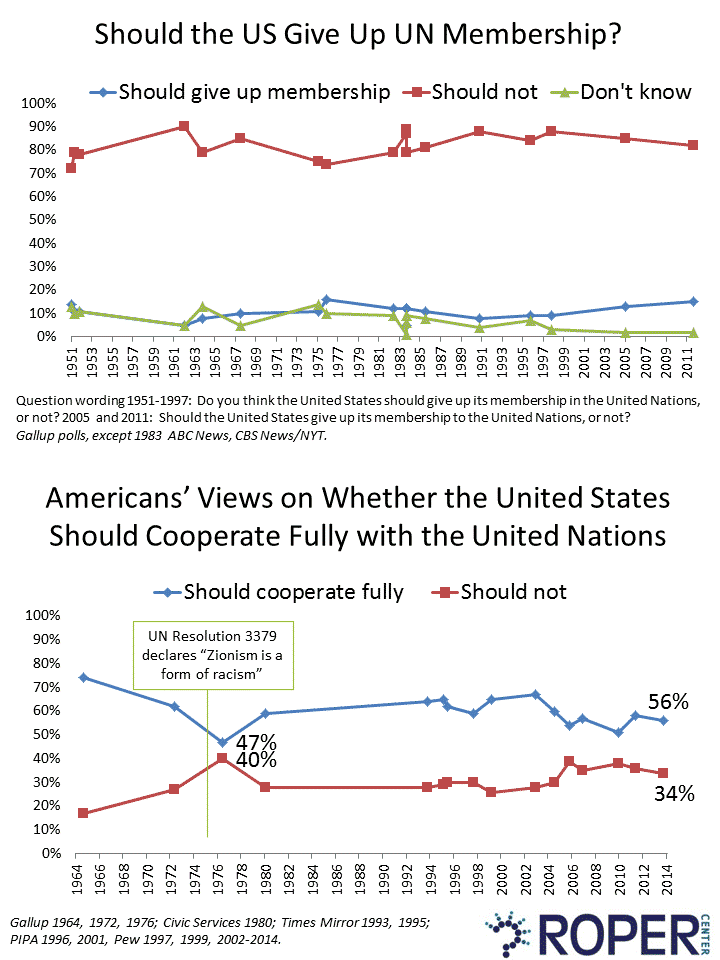 Though responses to these two questions have stayed relatively stable, Americans' rating of the job being done by the U.N. has varied considerably over the last sixty years. Responses to this question appear to be sensitive to events. For example, the proportion saying that the U.N. was doing a poor job increased from 1978 to 1980. At that time, more than half the public in a Time/Yankelovich, Skelly & White poll said the way the Security Council handled “the Iranian situation" - the hostage crisis and related issues - made them think less of the U.N. as a peacekeeping organization; only 21% said it made them think more of the U.N. Similarly, 53% said the way the U.N. handled the 1979 Russian invasion of Afghanistan made them think less of the U.N.'s peacekeeping, while 22% said it made them think more.
Though responses to these two questions have stayed relatively stable, Americans' rating of the job being done by the U.N. has varied considerably over the last sixty years. Responses to this question appear to be sensitive to events. For example, the proportion saying that the U.N. was doing a poor job increased from 1978 to 1980. At that time, more than half the public in a Time/Yankelovich, Skelly & White poll said the way the Security Council handled “the Iranian situation" - the hostage crisis and related issues - made them think less of the U.N. as a peacekeeping organization; only 21% said it made them think more of the U.N. Similarly, 53% said the way the U.N. handled the 1979 Russian invasion of Afghanistan made them think less of the U.N.'s peacekeeping, while 22% said it made them think more.
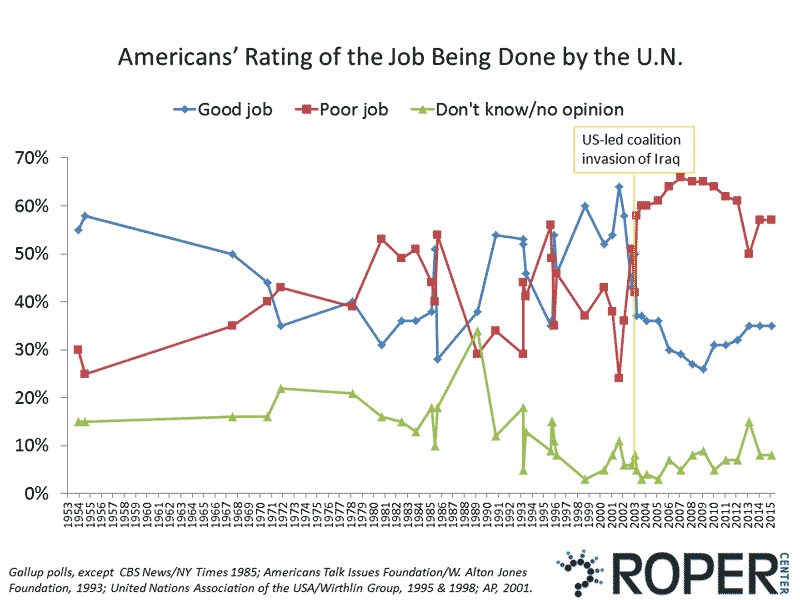 Job ratings became more positive in the early 1990s, dipped some during the Bosnia conflict, then rose again in the late 1990s, when 73% of Americans in a March 1998 CBS poll said they approved of the agreement Kofi Annan reached with Saddam Hussein for allowing U.N. weapons inspectors access in Iraq. Support peaked immediately following 9/11.
The September 11th attacks, however, set the stage for the most dramatic and long-lasting changes in the U.S. public's assessment of the United Nations. Job ratings fell after the U.S. had to withdraw its proposed resolution to take military action against Iraq because of threatened vetoes in U.N. Security Council. The U.S. went ahead with the invasion, along with a “coalition of the willing," but a 2003 Gallup/CNN/USA Today Poll found that Security Council not supporting the invasion of Iraq made 55% of Americans have a less favorable view of the U.N., while 15% said they had a more favorable view of the UN as a result, and 29% said it made no difference. The proportion of Americans rating the job the UN was doing as poor jumped to 58% and has continued at historically high levels since.
Despite these changes, most Americans still see the U.N. as a key actor in world affairs. In a 2014 Gallup poll, 25% said the U.N. should play a leading role where all countries are required to follow U.N. policies, and 37% said it should play a major role, where the U.N. establishes policies, but individual countries still act separately when they disagree with the U.N. Only about a third believed it should play a minor role, mostly as a forum for communication between nations. A 2013 Pew poll found 37% of the country believed strengthening the U.N. should be a top priority for the U.S., and 42% thought it should have some priority. Such levels of support may be a far cry from wanting the U.N. turned into a world government, but Americans still believe, seventy years on, that the U.N.'s relevance and importance continues.
Job ratings became more positive in the early 1990s, dipped some during the Bosnia conflict, then rose again in the late 1990s, when 73% of Americans in a March 1998 CBS poll said they approved of the agreement Kofi Annan reached with Saddam Hussein for allowing U.N. weapons inspectors access in Iraq. Support peaked immediately following 9/11.
The September 11th attacks, however, set the stage for the most dramatic and long-lasting changes in the U.S. public's assessment of the United Nations. Job ratings fell after the U.S. had to withdraw its proposed resolution to take military action against Iraq because of threatened vetoes in U.N. Security Council. The U.S. went ahead with the invasion, along with a “coalition of the willing," but a 2003 Gallup/CNN/USA Today Poll found that Security Council not supporting the invasion of Iraq made 55% of Americans have a less favorable view of the U.N., while 15% said they had a more favorable view of the UN as a result, and 29% said it made no difference. The proportion of Americans rating the job the UN was doing as poor jumped to 58% and has continued at historically high levels since.
Despite these changes, most Americans still see the U.N. as a key actor in world affairs. In a 2014 Gallup poll, 25% said the U.N. should play a leading role where all countries are required to follow U.N. policies, and 37% said it should play a major role, where the U.N. establishes policies, but individual countries still act separately when they disagree with the U.N. Only about a third believed it should play a minor role, mostly as a forum for communication between nations. A 2013 Pew poll found 37% of the country believed strengthening the U.N. should be a top priority for the U.S., and 42% thought it should have some priority. Such levels of support may be a far cry from wanting the U.N. turned into a world government, but Americans still believe, seventy years on, that the U.N.'s relevance and importance continues.
A Union of Nations: 1940s -1970
By the middle of WWII a majority of Americans approved of the U.S. joining a union of nations designed to protect peace in the postwar years. As many as 87% favored such a plan in a 1942 NORC survey and as few as 64% in 1944, but this idea consistently drew majority support. Americans were willing to see the new union take on a broad range of responsibilities in the postwar era, with majorities saying such an organization should prevent member countries from starting wars, decide what military strength member nations could have, and even set up different systems of government for countries that had systems that “might lead to trouble." The potential membership of such an organization, however, was controversial. Nearly all Americans agreed that the Allied countries should be members, but the country was split on whether the Axis powers should be included. The public was also divided on how power ought to be allotted among member organizations. While 43% thought all member countries should have equal say, 45% believed that either the U.S. alone or the U.S., Britain and Russia together should wield greater influence.
The potential membership of such an organization, however, was controversial. Nearly all Americans agreed that the Allied countries should be members, but the country was split on whether the Axis powers should be included. The public was also divided on how power ought to be allotted among member organizations. While 43% thought all member countries should have equal say, 45% believed that either the U.S. alone or the U.S., Britain and Russia together should wield greater influence.
 In April 1945, the San Francisco conference to write the charter was held. In a NORC poll, just over half of the public wanted the U.S. delegate to pledge the country to join the world organization and promise the use of American forces if needed. Twenty-three percent wanted the U.S. to join, but not commit troops, and 18% did not want the U.S. to join at all. Some Americans were quite optimistic about the potential effectiveness of the organization, while others had doubts. In a Gallup poll, 44% thought it was possible the U.N. would work out a peace that would last for at least 50 years, 36% said no, and 20% didn't know. But despite reservations, a strong majority wanted the country to be part of the new union of nations. An Office of Public Opinion Research poll found 81% of the country thought the U.S. should join the organization being worked out by the United Nations at San Francisco, even if we “didn't like some parts of it."
Many Americans, in fact, were willing in the first years of the U.N. to see its power go further - much further. A majority said the U.N. should be strengthened to make it a world government with power to control the armed forces of all nations, including the U.S. But opposition to this idea grew in the 1950s.
In April 1945, the San Francisco conference to write the charter was held. In a NORC poll, just over half of the public wanted the U.S. delegate to pledge the country to join the world organization and promise the use of American forces if needed. Twenty-three percent wanted the U.S. to join, but not commit troops, and 18% did not want the U.S. to join at all. Some Americans were quite optimistic about the potential effectiveness of the organization, while others had doubts. In a Gallup poll, 44% thought it was possible the U.N. would work out a peace that would last for at least 50 years, 36% said no, and 20% didn't know. But despite reservations, a strong majority wanted the country to be part of the new union of nations. An Office of Public Opinion Research poll found 81% of the country thought the U.S. should join the organization being worked out by the United Nations at San Francisco, even if we “didn't like some parts of it."
Many Americans, in fact, were willing in the first years of the U.N. to see its power go further - much further. A majority said the U.N. should be strengthened to make it a world government with power to control the armed forces of all nations, including the U.S. But opposition to this idea grew in the 1950s.
 Americans may have become less willing to see the U.N. grow into a world government, but that change does not necessarily indicate growing disenchantment with the organization in this period. On the contrary, the proportion of people saying they were satisfied with the progress made by the U.N. increased substantially over approximately the same time frame.
Americans may have become less willing to see the U.N. grow into a world government, but that change does not necessarily indicate growing disenchantment with the organization in this period. On the contrary, the proportion of people saying they were satisfied with the progress made by the U.N. increased substantially over approximately the same time frame.
 Positive attitudes continued through the 1960s. A 1964 Anti-Defamation League of B'nai B'rith/NORC poll found 87% of Americans in favor of the United Nations. In a 1965 Gallup poll, 59% believed that, without the U.N, there would have been another world war.
Positive attitudes continued through the 1960s. A 1964 Anti-Defamation League of B'nai B'rith/NORC poll found 87% of Americans in favor of the United Nations. In a 1965 Gallup poll, 59% believed that, without the U.N, there would have been another world war.
Commitment and Conflict: 1970s-Today
Several long polling trends reveal the ambivalence Americans have felt toward the U.N. over the past four decades. On one hand, very strong majorities consistently affirm that the U.S. should retain its membership in the U.N. A majority of Americans since the early 1970s have also said the United States should cooperate fully with the U.N., though a substantial minority have disagreed. The lowest proportion in agreement was found in a 1976 poll, a year after U.N. Resolution 3379, which declared Zionism was a form of racism. Just 9% of Americans in a 1975 Harris poll approved of this resolution, while 49% disapproved, and 42% were not sure. Though responses to these two questions have stayed relatively stable, Americans' rating of the job being done by the U.N. has varied considerably over the last sixty years. Responses to this question appear to be sensitive to events. For example, the proportion saying that the U.N. was doing a poor job increased from 1978 to 1980. At that time, more than half the public in a Time/Yankelovich, Skelly & White poll said the way the Security Council handled “the Iranian situation" - the hostage crisis and related issues - made them think less of the U.N. as a peacekeeping organization; only 21% said it made them think more of the U.N. Similarly, 53% said the way the U.N. handled the 1979 Russian invasion of Afghanistan made them think less of the U.N.'s peacekeeping, while 22% said it made them think more.
Though responses to these two questions have stayed relatively stable, Americans' rating of the job being done by the U.N. has varied considerably over the last sixty years. Responses to this question appear to be sensitive to events. For example, the proportion saying that the U.N. was doing a poor job increased from 1978 to 1980. At that time, more than half the public in a Time/Yankelovich, Skelly & White poll said the way the Security Council handled “the Iranian situation" - the hostage crisis and related issues - made them think less of the U.N. as a peacekeeping organization; only 21% said it made them think more of the U.N. Similarly, 53% said the way the U.N. handled the 1979 Russian invasion of Afghanistan made them think less of the U.N.'s peacekeeping, while 22% said it made them think more.
 Job ratings became more positive in the early 1990s, dipped some during the Bosnia conflict, then rose again in the late 1990s, when 73% of Americans in a March 1998 CBS poll said they approved of the agreement Kofi Annan reached with Saddam Hussein for allowing U.N. weapons inspectors access in Iraq. Support peaked immediately following 9/11.
The September 11th attacks, however, set the stage for the most dramatic and long-lasting changes in the U.S. public's assessment of the United Nations. Job ratings fell after the U.S. had to withdraw its proposed resolution to take military action against Iraq because of threatened vetoes in U.N. Security Council. The U.S. went ahead with the invasion, along with a “coalition of the willing," but a 2003 Gallup/CNN/USA Today Poll found that Security Council not supporting the invasion of Iraq made 55% of Americans have a less favorable view of the U.N., while 15% said they had a more favorable view of the UN as a result, and 29% said it made no difference. The proportion of Americans rating the job the UN was doing as poor jumped to 58% and has continued at historically high levels since.
Despite these changes, most Americans still see the U.N. as a key actor in world affairs. In a 2014 Gallup poll, 25% said the U.N. should play a leading role where all countries are required to follow U.N. policies, and 37% said it should play a major role, where the U.N. establishes policies, but individual countries still act separately when they disagree with the U.N. Only about a third believed it should play a minor role, mostly as a forum for communication between nations. A 2013 Pew poll found 37% of the country believed strengthening the U.N. should be a top priority for the U.S., and 42% thought it should have some priority. Such levels of support may be a far cry from wanting the U.N. turned into a world government, but Americans still believe, seventy years on, that the U.N.'s relevance and importance continues.
Job ratings became more positive in the early 1990s, dipped some during the Bosnia conflict, then rose again in the late 1990s, when 73% of Americans in a March 1998 CBS poll said they approved of the agreement Kofi Annan reached with Saddam Hussein for allowing U.N. weapons inspectors access in Iraq. Support peaked immediately following 9/11.
The September 11th attacks, however, set the stage for the most dramatic and long-lasting changes in the U.S. public's assessment of the United Nations. Job ratings fell after the U.S. had to withdraw its proposed resolution to take military action against Iraq because of threatened vetoes in U.N. Security Council. The U.S. went ahead with the invasion, along with a “coalition of the willing," but a 2003 Gallup/CNN/USA Today Poll found that Security Council not supporting the invasion of Iraq made 55% of Americans have a less favorable view of the U.N., while 15% said they had a more favorable view of the UN as a result, and 29% said it made no difference. The proportion of Americans rating the job the UN was doing as poor jumped to 58% and has continued at historically high levels since.
Despite these changes, most Americans still see the U.N. as a key actor in world affairs. In a 2014 Gallup poll, 25% said the U.N. should play a leading role where all countries are required to follow U.N. policies, and 37% said it should play a major role, where the U.N. establishes policies, but individual countries still act separately when they disagree with the U.N. Only about a third believed it should play a minor role, mostly as a forum for communication between nations. A 2013 Pew poll found 37% of the country believed strengthening the U.N. should be a top priority for the U.S., and 42% thought it should have some priority. Such levels of support may be a far cry from wanting the U.N. turned into a world government, but Americans still believe, seventy years on, that the U.N.'s relevance and importance continues.
